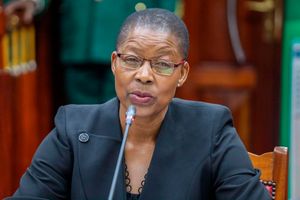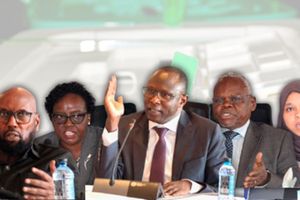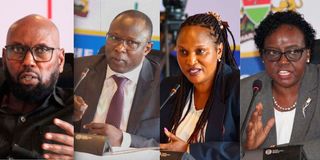
IEBC nominees Hassan Noor Hassan, Erastus Edung Ethekon (chairperson), Anne Nderitu and Mary Karen Sorobit.
The High Court on Monday halted the planned vetting of President William Ruto’s seven nominees for chairperson and member of the electoral commission, following a petition citing alleged legal missteps by the Head of State and the selection panel.
The temporary order issued by Justice Lawrence Mugambi of the Constitutional division in Milimani, Nairobi, has the effect of slowing the reconstitution of the polls body after a two-year delay. The order is directed to the National Assembly.
Independent Electoral and Boundaries Commission (IEBC) reconstitution was part of public demands during the 2024 anti-government demonstrations.
Justice Mugambi halted the planned vetting following an application by two citizens, Kelvin Roy Omondi and Boniface Mwangi, who expressed concerns that the law was violated in the selection process of the nominees by President Ruto and the Nelson Makanda-led Selection Panel.
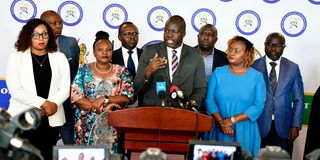
The chairperson of the Independent Electoral and Boundaries Commission (IEBC) Selection Panel, Dr Nelson Makanda (center, podium), briefs the media on April 25, 2025. He is with other members of the panel.
The order will remain in force until May 29 when the court will deliver a substantive ruling on the application. The National Assembly had already invited public views on the suitability of the nominees to serve at the polls body.
Through lawyers Paul Muite, senior counsel, Arnold Oginga, Dudley Ochiel and Douglas Otieno, the petitioners told the judge that there was an imminent risk that the National Assembly may proceed to vet and approve the nominees if the interim orders were not be granted. This, they said, would have affected the body of their petition.
Their case was hinged on three key allegations. First, they argued that four of the seven nominees -Erastus Edung Ethekon (proposed chairperson) together with Hassan Noor Hassan, Mary Karen Sorobit and Anne Nderitu -were ineligible for the job. The other three nominees are Moses Mukwana, Francis Odhiambo and Fahima Araphat Abdallah.
Secondly, it was alleged that President Ruto failed to consult the Opposition Party in the selection process as required under the National Dialogue Committee (NADCO) Report and the IEBC (Amendment) Act, 2024.
Another key argument was that the President failed to observe regional and ethnic balance in the selections. They told court that two nominees - Mr Ethekon and Sorobit -are from Rift Valley region while the Lower and Upper Eastern regions were excluded.
During the hearing session, Attorney-General Dorcas Oduor had defended the President and pleaded with the court to dismiss the application.
Through Chief State Counsel Emmanuel Bitta, the AG said the petition should not have been entertained by court and it deserved to be thrown out.
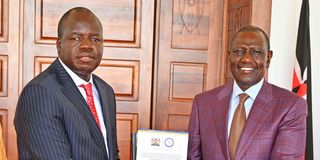
President William Ruto receives the report on the recruitment of nominees for the positions of chairperson and members of the IEBC from Selection Panel Chairman, Dr Nelson Makanda at State House, Nairobi.
According to the AG, the questions raised by the petitioners, such as on eligibility of four of the seven nominees and the alleged failure by President Ruto to consult the Opposition Party in the selection process, were unsuitable for resolution by the court.
"The petition is non-justiciable on account of having been instituted contrary to the principle of ripeness. The petitioners have not exhausted the first instance, constitutionally provided remedy before invoking the jurisdiction of the court, thereby contravening the doctrine of exhaustion," said Mr Bitta in a preliminary objection.
And since the nominees were waiting the parliamentary approval process to assume their positions at the Commission, Mr Bitta argued that the court lacked power to stop Parliament from performing its mandate to vet the nominees.
The petition alleges that the selection of the seven nominees was unlawful. The petitioners had also applied for two alternative orders stopping the President from appointing the nominees and barring the nominees from assuming their respective roles at IEBC pending determination of the case.
It is their case that Mr Ethekon, Mr Hassan, Ms Sorobit and Ms Nderitu were not qualified to apply or to be selected at members of the IEBC. This is due to perceived bias, breach of the principles of political neutrality, vying for political posts in 2022, being member of a political party and failure to leave a State office before their nomination.
The lawsuit is also questioning why President Ruto chose Mr Ethekon as chairperson over Mr Edward Katama Ngeywa, who had been proposed to the same post by the Selection Panel.
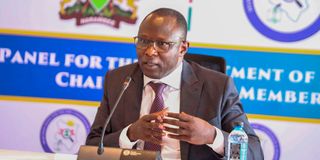
Erastus Edung Ethekon has been nominated by President William Ruto as IEBC chairperson.
Also questioned is President's decision to reject Mr Phillip Kakai from Kakamega county, Mr Joseph Kyavoa (Kitui) and Mohammed Abdullahi Abdi (Mandera/Nairobi), whom the panel had proposed to be nominated as commissioners.
"The Selection Panel’s report and outcome of the interviews constituted important information to be shared with the public. It was unconstitutional for the President and the Selection Panel to fail to publicize the information relating to the performance of the candidates and the report on the interviews. The petitioners requested for the information pertaining to the interviews but their request was ignored," reads the court papers.
However, State Counsel Bitta argued that the case was prematurely filed in court and that the court lacks powers to block Parliament from exercising its mandate to vet the nominees.
"The exercise of jurisdiction by the court at this stage of the appointment process of Commissioners of an independent constitutional commission would be contrary to the doctrine of separation of powers and would constitute usurpation of the primary role of the legislature in the approval process," argued Mr Bitta.
According to him, "the petition merits dismissal under the constitutional avoidance doctrine".
Mr Ethekon was selected from a pool of 39 applicants who wanted to be IEBC chairperson while the six proposed commissioners were chosen from a list of 1345 applicants.
"The nominations contravene the Constitution in that they are not representative of Kenya’s diverse communities, exclude other ethnic communities and persons with disabilities. The nominees were selected without any prior consultation with the opposition political party as required under the National Dialogue Committee Report and IEBC (Amendment) Act, 2024,” says the petitioners.
They believe Mr Ethekon's nomination as chairperson is laced with perception of likelihood of being biased on account of his inclinations and affiliations with Mr Josephat Nanok, the Statehouse Deputy Chief of Staff.
The court papers show that Mr Ethekon served as Turkana County Attorney when Mr Nanok was the governor, “hence the nomination is tainted with the impartiality and neutrality required of a Chairperson of IEBC”.
"The nominations are not only illegal but also unconstitutional for failing the requirements of Public Appointments as espoused under Articles 10, 232 and 250 (3) and (4) of the Constitution of Kenya, 2010 as read with the IEBC Act, and the Public Appointments (Parliamentary
Approval) Act," they argue.
"The selection is not based on merit as some of the candidates did not achieve high scores in the interviews, and some have integrity issues while other candidates were irregularly added to the shortlist thus compromising the process and inviting the court’s sanction".
The substantive ruling on the application will be delivered on May 29, 2025.

